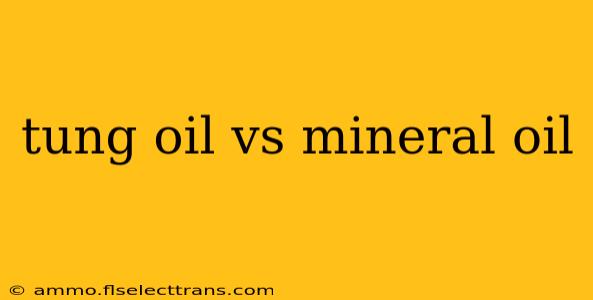Choosing the right oil for finishing your wood projects can feel overwhelming. Two popular choices often top the list: tung oil and mineral oil. While both offer protection and enhance the wood's natural beauty, they differ significantly in their properties, application, and ultimate results. This comprehensive guide will delve into the key distinctions between tung oil and mineral oil, helping you make an informed decision for your next woodworking endeavor.
Understanding Tung Oil
Tung oil, extracted from the seeds of the tung tree, is a drying oil. This means it polymerizes (hardens) when exposed to air, forming a durable, protective film on the wood's surface. This film provides excellent water resistance and enhances the wood's natural luster. True tung oil is a prized finish among woodworkers for its rich, deep finish and lasting protection.
Advantages of Tung Oil:
- Durable and Protective: Forms a hard, protective layer resistant to water and minor scratches.
- Enhanced Appearance: Deepens the wood's natural color and grain, giving it a rich, lustrous sheen.
- Food Safe (with proper curing): Once fully cured, it can be used on surfaces that come into contact with food, making it suitable for cutting boards and kitchenware.
- Naturally Derived: A plant-based oil, appealing to environmentally conscious woodworkers.
Disadvantages of Tung Oil:
- Slow Drying Time: Requires multiple coats and ample drying time between applications (often days or even weeks).
- Can Be Expensive: True tung oil is more costly than mineral oil.
- Requires Careful Application: Improper application can lead to uneven finishes.
- Potential for Allergic Reactions: Some individuals may experience allergic reactions to tung oil.
Understanding Mineral Oil
Mineral oil, a byproduct of petroleum refining, is a non-drying oil. This means it doesn't harden or form a protective film. Instead, it penetrates the wood, lubricating it and preventing dryness. It offers minimal protection against water and scratches.
Advantages of Mineral Oil:
- Easy Application: Simple to apply and requires minimal effort.
- Fast Absorption: Penetrates quickly and doesn't require extensive drying time.
- Inexpensive: Significantly cheaper than tung oil.
- Food Safe: Generally considered safe for use on surfaces that contact food.
Disadvantages of Mineral Oil:
- Minimal Protection: Offers little protection against water damage or scratches.
- Requires Frequent Reapplication: The protective effects are temporary and need frequent reapplication.
- Doesn't Enhance Appearance: Doesn't significantly enhance the wood's color or grain.
- Can Become Slippery: Can leave a slightly slippery surface when initially applied.
Tung Oil vs. Mineral Oil: A Side-by-Side Comparison
| Feature | Tung Oil | Mineral Oil |
|---|---|---|
| Type | Drying Oil | Non-drying Oil |
| Drying Time | Slow (days/weeks) | Fast (minutes/hours) |
| Durability | High | Low |
| Water Resistance | High | Low |
| Protection | Excellent | Minimal |
| Appearance | Enhances wood's natural beauty | Minimal effect on appearance |
| Cost | More Expensive | Less Expensive |
| Application | Requires more care and skill | Easy to apply |
| Food Safety | Yes (after curing) | Yes |
Choosing the Right Oil for Your Project
The best choice depends entirely on your project's needs and your desired outcome.
-
Choose Tung Oil for: High-end furniture, cutting boards, kitchenware (after proper curing), items requiring superior protection and a beautiful finish.
-
Choose Mineral Oil for: Butcher blocks, wooden utensils, projects needing simple lubrication and protection but not needing a hard, durable finish. It's also ideal for regular maintenance of already-finished wooden items.
Ultimately, understanding the key differences between tung oil and mineral oil empowers you to select the appropriate oil for your specific woodworking project, leading to a beautifully finished and long-lasting piece. Remember to always read and follow the manufacturer's instructions for each product.

